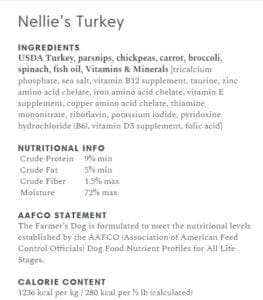The Farmer’s Dog has its skeptics: veterinarians
Veterinarians weigh in on The Farmer’s Dog
Following our publication of an earlier story about The Farmer’s Dog, we heard from veterinarians who were adamantly against the food and said that they would not feed The Farmer’s Dog to their own dogs or recommend the food to clients, regardless of cost.
Asked about a sample recipe from The Farmer’s Dog for turkey, which the company’s website generated based on information we entered about five-year-old Labrador Nellie, Korinn Saker, a board-certified veterinary nutritionist at the College of Veterinary Medicine at North Carolina State University who is also an associate professor of clinical nutrition, said:

“The fat level is higher than what I would feed to them [her own dogs] and I’d prefer a diet that has undergone animal feed tests by AAFCO protocol.”
The AAFCO, which stands for the Association of American Feed Control Officials, is a voluntary membership organization that helps to regulate pet food. Dr. Saker also said the fact that the food is grain-free concerns her, but not as much as the first two issues – those are, the fat content and the lack of AAFCO testing. She tries to avoid such foods.
“We can’t say that it’s [cardiac disease in some dogs] specifically associated with them being on a grain-free diet. There is an association. We don’t have any idea yet what the mechanism of action could be for that association but from a nutritionist’s perspective, I try not to recommend diets that are grain-free right now because there are so many other diets on the market that have grains in them.”
Dr. Saker’s chief concern was the high-fat level, not the fact that the food is grain-free, nor the fact that the food is not AAFCO tested. “If the fat level was a little lower, that would be nice. It’s not that there aren’t diets that are fed to adult maintenance dogs that are that high in level of fat. From my perspective as a nutritionist, when I see a lot of more mature and older dogs that are really overweight and obese, part of the reason is because their diet is high in fat.”
Steven Rosenthal is one of the world’s leading experts on dilated cardiomyopathy in dogs and a board-certified veterinary cardiologist who is part of CVCA, a veterinary practice of cardiologists who were among the first to alert the U.S. Food and Drug Administration to the possible connection between grain-free diets and cardiac disease in dogs. Dr. Rosenthal told The Canine Review that the fact that The Farmer’s Dog is grain-free is not what troubles him. Rather, it is the fact that the food is not tested according to AAFCO standards.
Echoing Dr. Saker, Dr. Rosenthal said he is less troubled about the fact that the food is grain-free.
“We do not believe that the exclusive reasoning being the nutritionally mediated heart disease is the fact that the diet is just grain-free any longer,” said Rosenthal, who is also working with the FDA on case studies involving grain-free dog food. “There are grain-free products that are not associated with heart disease. Being a grain-free product was the initial concern as this was the most obvious factor tying the cases of affected patients together. It is a complex issue that may have a number of factors and at this stage, we are focusing on the high legume content of the diets in affected dogs. I can tell you that I don’t personally use that diet for my own dog. I would prefer a diet that has gone through [AAFCO protocol] feed testing,” he added.
We also spoke with Martha Cline, a board-certified veterinary nutritionist at Red Bank Veterinary Hospital in Tinton Falls, New Jersey. Dr. Cline said that she does not comment on specific brands, but asked generally about the fact that the food was both grain-free and about the AAFCO statement, she said that while her preference is a diet “that is formulated to meet the nutritional levels for the intended life stage AND undergoes AAFCO feeding tests [The Farmer’s Dog does not do the AAFCO feeding tests],” there are also foods that she recommends “that just state formulation.” Dr. Cline echoed Dr. Rosenthal, saying, “The association between diet-associated DCM is still being investigated and there is a lot we don’t yet know. The cause is likely multifactorial and likely involves both the diet and the individual dog’s response to that diet and how it is fed.” All of the doctors agreed that AAFCO testing was a good thing or, as Dr. Rosenthal phrased it, “an extra layer of comfort.”
A New York veterinarian who asked not to be named offered a more blunt assessment:
“I do not feel comfortable with this diet at all. Especially in light of the whole cardiomyopathy (cardiac) issue with boutique diets that are grain-free. Do they have a veterinary nutritionist (someone with a DVM that is boarded in nutrition) guiding them through what they are making? Is the diet AAFCO tested? I would not recommend this diet to any of my patients. If a client wanted to do a home-cooked meal, I would refer them to a veterinary nutritionist that could create the appropriate food and vitamins.”
The Farmer’s Dog responds
Responding to the concern that the recipe is grain-free, the 32-year-old co-founder of The Farmer’s Dog Brett Podolsky said in a follow-up telephone interview:
“There’s absolutely no conclusive evidence whatsoever proving that boutique, grain-free, or exotic – BEG is what they’re referring to it as – has any connection to DCM…All or 99% of the cases were reported to the FDA about dogs getting DCM were [dogs who eat] dry food. Also, about 40% of dogs in the country are eating grain-free foods, so statistically, it’s going to work out like that every single time.“
Asked about the absence of AAFCO testing, Podolsky said:
“What a lot of vets don’t realize is that the AAFCO feeding trials…is animal testing. They do it in colonies. And we do not support that. We don’t support testing on animals. We are looking into doing something like this….The real reason, though, is that the blood tests that are required will have no indication to prove whether or not the food will cause DCM..AAFCO really needs to change what their requirements are in order to make their feeding trials worthwhile for brands to do. It also is extremely, extremely expensive and boxes out any entering competitors from getting into the business.”
Podolsky continued: “If you speak to someone like the really reputable people in the formulation world, they’ll say that the feeding trials really don’t test for enough. They’ll also say that they really believe that this is a protein quality issue.”
Podolsky said that fundamentally,
“What we believe is that as long as they’re eating fresh food and it’s a good quality protein and you get all of your amino acids from that protein,” a dog would not be at risk for an issue like cardiac disease as a result of diet. “It’s heartbreaking what these dogs are going through and it’s sad that a lot of these few vets are pointing at diets that are not causing this….There has been no conclusive evidence to prove that any one type of diet has been causing this. All that we do have to point at is that the vast majority of the diets that the dogs are eating that are getting DCM are dry kibble. The highly processed foods. We’re not seeing this pop up in dogs eating fresh food. We’re not seeing this pop up in dogs eating actual meat.”

